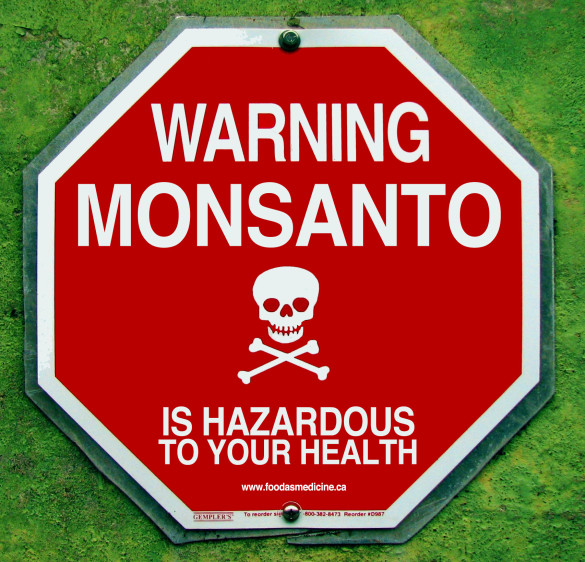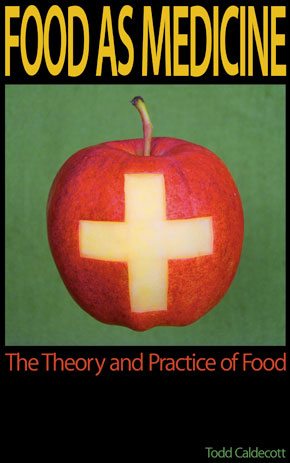A recent paper published in Interdisciplinary Toxicology suggests that Monsanto’s glyphosate may be a direct causative factor in the development of celiac disease. In their review, the authors provide evidence that glyphosate provokes celiac disease through a number of mechanisms:
1. Gut bacteria: Celiac patients often exhibit problems with impaired gut ecology, leading to alterations in bowel function that provoke clinical symptoms. In several animal studies, glyphosate has been shown to be directly toxic to probiotic organisms, facilitating the growth of gut pathogens including Clostridium difficile.
2. Inhibition of cytochrome P450 (CYP): Glyphosate has been shown to inhibit CYP enzymes in the liver, which act to detoxify a variety of poisons acquired from our diet and the environment. Inhibition of CYP not only increases susceptibility to toxins, it also impairs the hydroxylation of vitamin D3. A deficiency of vitamin D3 can be found in as much as 60% of the population that live in northern climates such as Canada, linked to metabolic disorders such as heart disease, and autoimmune disease such as multiple sclerosis. At the same time, glyphosate-induced deficiency of CYP enzymes could lead to increases in retinoic acid, a metabolite of vitamin A that quickly becomes toxic, and may contribute to the pathology of celiac disease. Inhibition of the liver and CYP enzymes by glyphosate could also disrupt the transport of sulfate from the gut to the liver and pancreas, resulting in reduced bile acid production, liver damage, pancreatic inflammation, and damage to the intestinal villi.
3. Nutrient deficiencies: Glyphosate may promote a broad range of nutrient deficiencies commonly seen in celiac disease. Glyphosate has been shown to chelate vital minerals in the GI tract, including iron, molybdenum, and selenium, leading to an increased risk of iron-deficiency anemia, venous thrombosis, and thyroid disorders, all of which are common issues in patients with celiac disease. Other nutrient deficiencies commonly seen in celiac disease also appear to be linked to glyphosate, which disrupts the synthesis of key amino acids in food plants, including tryptophan, tyrosine and methionine, as well as the uptake of iron, magnesium, manganese and calcium.
These are only a few of the points raised by the paper. There is also mention that celiac patients have an increased risk of non-Hodgkin’s lymphoma, the incidence of which has been steadily rising since glyphosate was first introduced in the 1970s. And in a similar fashion, the authors provide a chart showing that the incidence of celiac disease has risen and decreased in direct proportion to glyphosate use, possibly explaining what appears to be the sudden phenomena of widespread gluten intolerance.
 So what do I think of the paper? What is immediately striking is that some of the arguments are little more than conjectures, and hence are subject to a great deal of interpretation. It doesn’t help that neither of the authors are medical practitioners nor established experts in the field, and so doubts will be raised about their paper, particularly because the journal that published it, Interdisciplinary Toxicology, isn’t what I would call a mainstream publication. As such, the conclusions of the authors need to be taken with a grain of salt, realizing that the research doesn’t point so much to a smoking gun, as it provides some thought-provoking ideas that needs follow-up from other researchers.
So what do I think of the paper? What is immediately striking is that some of the arguments are little more than conjectures, and hence are subject to a great deal of interpretation. It doesn’t help that neither of the authors are medical practitioners nor established experts in the field, and so doubts will be raised about their paper, particularly because the journal that published it, Interdisciplinary Toxicology, isn’t what I would call a mainstream publication. As such, the conclusions of the authors need to be taken with a grain of salt, realizing that the research doesn’t point so much to a smoking gun, as it provides some thought-provoking ideas that needs follow-up from other researchers.
I am no fan of Monsanto, a huge multinational conglomerate that time and again has been found guilty of the agricultural equivalent of piracy. But do I think that Monsanto’s glyphosate is the cause of celiac disease? Perhaps… this review seems rather adamant, and I worry about having too myopic of a focus. We often use terms like “cause” in an exclusive way, not fully comprehending that disease, like life, is multifactoral. Thus while glyphosate could contribute to the incidence of celiac disease and gluten intolerance, there are other explanations as well, apart from the inherent toxicity of this storage protein.
One under-explored mechanism I discuss in Food As Medicine is the inherent toxicity of ALL seeds – essentially – because seeds contain a variety of toxins to discourage predation. Think about it: seeds are little babies, the future of the species, and would any mother send their children off into the world without some kind of protection? Nope – which is why seeds contain a hard waxy coating and are impregnated with a plethora chemicals that are inherently toxic, or do things like inhibit digestion and absorption. There are many many examples of these constituents, including toxic storage proteins, lectins, phytic acid, and non-protein amino acids. Humans are the only mammals to selectively eat and attempt to digest small seeds. To be sure: a cow or a horse may swallow seeds while grazing, but most of the seeds are eliminated undigested in the animal’s stool. This is all part of the dalliance between plants and animals for millions of years, and the plants’ grand design to promote seed distribution.
With the advent of the agricultural revolution 9000 years ago, humans began to selectively eat seeds that we had never eaten before, in large quantities and on a chronic basis. And in so doing, the archeological record shows that our ancestors experienced a dramatic decline in health and longevity, from a life expectancy of around 54 in hunter-gatherers, to around 20 in neolithic farmers. Commensurate with this decrease in longevity was a reduction both body mass and height, as well as an increase in infectious disease, infant mortality, increase in iron deficiency anemia, osteomalacia, dental caries and enamel defects (Cordain 1999).
The basic signs and symptoms of celiac disease have been around for a very long time. In the agrarian society of ancient India, a disease called grahani was described in the texts of Ayurveda, characterized by digestive weakness, chronic diarrhea and weight loss. In ancient Greece, the physician Aretaeus of Cappadocia described a condition called ‘koiliakos’ that resembles celiac disease, bolstered by archeological evidence that celiac disease was found in the Mediterranean (Gasbarrini et al 2012). More recently, a disease called pellagra that has a very similar progression to celiac disease ravaged the south-eastern United states for almost a hundred years, before the cause was determined to be improperly processed corn. Like our experiment with pellagra in the late 19th century, the spectre of widespread gluten intolerance has only arisen since we abandoned traditional methods of food preparation, such as the fermentation of wheat. Similar to the nixtamalization of corn, which prevents pellagra, fermenting wheat not only hydrolyzes gluten into harmless amino acids, but along with cooking, helps to denature the many anti-nutrient factors that have interfere with digestion and absorption. Traditional methods of food preparation such as fermentation have demonstrated their merit in clinical research, showing that when wheat is properly fermented, it can be safely given to celiacs without causing any clinical symptoms (Di Cagno et al 2004). I believe that once we restore these traditional methods of food processing, the incidence of gluten intolerance that has steadily increased over these last few generations will begin to decline. However, as this paper illustrates, there may be other factors in celiac disease, and if the suggestions of the authors prove true, it should be even more incentive to governments to ban the use of glyphosate.
References
Cordain L. 1999. Cereal grains: humanity’s double-edged sword. World Rev Nutr Diet. 84:19-73.
Di Cagno R. et al. 2004. Sourdough bread made from wheat and nontoxic flours and started with selected lactobacilli is tolerated in celiac sprue patients. Appl Environ Microbiol. 70(2):1088-96.
Gasbarrini G et al. 2012. Origin of celiac disease: how old are predisposing haplotypes? World J Gastroenterol. 18(37):5300-4.



Todd,
I always appreciate your thorough and helpful information. Would you recommend not eating seeds at all, or just prepared in a certain way (ie. soaked, fermented, etc)? I am slowly transitioning my family to a mostly grain-free diet, but right now we snack a lot on pumpkin, sunflower, chia seeds, etc.
Thanks,
Kelly
A small handful of nuts/seeds on a daily basis is unlikely to be an issue- but ideally – they should be soaked overnight to enhance digestion.